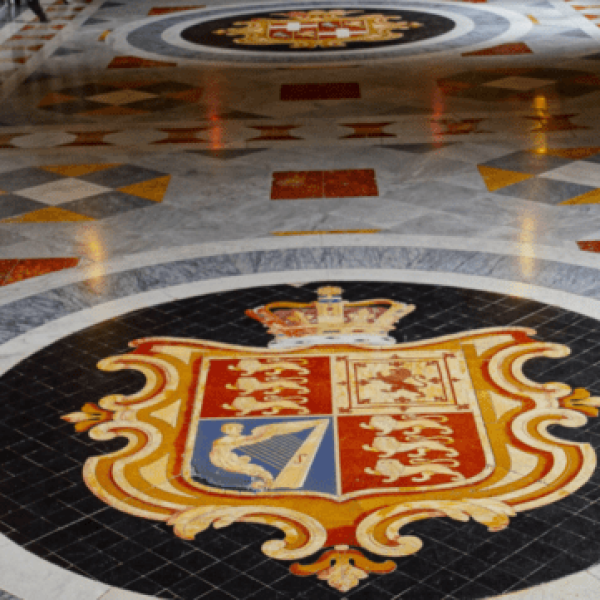The Sacred Heart of Jesus, a symbol Catholics have cherished for centuries, is more than an image or emblem. It’s a powerful representation of Christ’s boundless love for humanity and His divine mercy.
As we delve deeper into the meaning behind this sacred symbol, it’s essential to recognize that it isn’t merely an artistic representation; rather, it encompasses the very essence of our faith and serves as a profound reminder of our Lord’s unwavering devotion towards His children.
The Sacred Heart beckons us to come closer, inviting us to participate in an intimate relationship with Christ and calling us to share His love with others.
In exploring the theological significance of the Sacred Heart, we’ll uncover its rich history that dates back to biblical times while examining its continued relevance in today’s modern world.
We’ll discuss how this emblem can inspire and guide our spiritual journey as Catholics by fostering devotion, promoting unity, and encouraging us to imitate Christ’s unfathomable love daily.
By understanding the deep symbolism of the Sacred Heart, we are better equipped to embrace its message wholly and live out our faith more authentically.
Let us explore with open hearts and minds as we seek greater union with our loving Savior through the beautiful mystery of His most Sacred Heart.
In 1673, a humble French nun named Margaret Mary Alacoque began experiencing visions of Jesus Christ revealing His Sacred Heart to her. This event marked a pivotal moment in the history of Catholicism as it reinforced and popularized the devotion to the Sacred Heart worldwide.
The Sacred Heart art that followed these divine revelations depicts Christ’s heart as aflame with love for humanity, encircled by thorns representing our sins and surmounted by a cross symbolizing His sacrifice for our salvation. But this beautiful symbol is more than just an emblem of affection; it has its roots in ancient prophecies and scriptural foundations.
The concept of the Sacred Heart can be traced back to Old Testament prophecies and New Testament teachings. In Ezekiel 36:26-27, God promises to replace our hearts of stone with hearts of flesh, alluding to a transformation that allows us to love Him and others more profoundly. Similarly, St. Paul’s letter to the Romans (5:5) speaks about God pouring His love into our hearts through the gift of the Holy Spirit.
Thus, we see that devotion to the Sacred Heart is not simply an arbitrary practice but deeply rooted in holy scripture and tradition. By venerating Jesus’ heart ablaze with divine love, we are reminded of His infinite mercy towards us despite our human frailties and encouraged to emulate this love.
The Sacred Heart of Jesus holds immense theological significance in the Catholic faith. This divine symbol is a powerful reminder of Christ’s boundless and unconditional love for humanity, manifested most profoundly through His Passion and ultimate sacrifice on the Cross. As we contemplate the image of the Sacred Heart, we are called to enter into a deeper relationship with our Lord and to strive for a more authentic imitation of His Divine Compassion.
Theologically speaking, devotion to the Sacred Heart can be understood as an invitation to partake in the redemptive work of Christ, who offers Himself as an eternal source of mercy and healing for all souls.
To fully appreciate the richness of this devotion, we must delve into its manifold dimensions. Some key aspects that merit particular attention include:
- Atonement: By gazing upon the wounded heart of Christ, we are reminded that it is through His sufferings and death that our sins have been forgiven and mankind has been reconciled with God.
- Eucharistic Adoration: The image of Christ offering His heart invites us to deepen our appreciation for the gift of His Body and Blood in the Eucharist, where He remains present under the appearance of bread and wine.
- Reparation: The flames emanating from Jesus’ heart serve as a call to make amends for our sins and those committed by others against God’s love. In doing so, we participate in Christ’s redemptive mission.
As such, immersion into the profound mystery encapsulated within this sacred symbol beckons us towards greater intimacy with our Lord and growth in holiness. By embracing this path, may we become ever more radiant bearers of Christ’s Divine Compassion and Unconditional Love within our world.
As the gardener tends to his garden with love and devotion, watering and nurturing each plant, the Catholic devotee also cultivates their relationship with Christ through devotion to His Sacred Heart.
The blossoming of this spiritual bond can be likened to a rose that unfolds its petals under the loving care of its gardener. Such is the beauty of the devotional practices associated with the Sacred Heart, which serve as a means for believers to grow closer to Jesus and draw upon His infinite love.
When we gaze upon Sacred Heart artwork, we are reminded of Christ’s burning compassion for humanity and His desire for salvation.
Devotional rituals such as the First Friday Devotion or enthronement ceremonies in families’ homes serve as avenues for expressing one’s love and reverence towards Jesus, who bears His heart aflame for us all.
In participating in these rituals, Catholics deepen their faith and invite others into a shared experience of divine love. Through these practices, we understand that at the very core of our faith lies an intimate relationship with Christ – continually nurtured by our devotion towards His Sacred Heart.
In our present age, the Sacred Heart holds great significance and importance within the Catholic Church, as its symbolism reaches beyond its historical context and into contemporary iconography.
The profound meaning of this emblematic image remains deeply rooted in the love and mercy of Christ, serving as an enduring reminder for all who gaze upon it.
As society evolves and new forms of symbolic artistry emerge, the Sacred Heart adapts accordingly, ensuring its timeless message of divine compassion transcends cultural and generational boundaries.
As we reflect on the modern interpretations and relevance of the Sacred Heart, we must not lose sight of its central message: conveying God’s boundless love for humanity through Christ’s ultimate sacrifice.
Today’s artists continue to explore innovative ways to capture this eternal truth in their creative expressions while adhering to the rich tradition that defines Catholic theology.
In doing so, they contribute to a legacy of faith that continually nourishes our spiritual lives and draws us closer to the heart of Jesus Christ, our Lord, and Savior.

Once upon a time, in a small village nestled in the verdant hills, there lived a humble family who sought to embody the message of the Sacred Heart.
The father, wise and steadfast like an oak tree, bore his love for God and others as an emblem upon his chest; and the mother, tender and nurturing like a blossoming rose, cultivated her children’s hearts with a daily devotion.
To truly live in accordance with the Sacred Heart’s message, they followed four guiding principles:
- Embracing compassion: Just as Christ demonstrated divine empathy for humanity through His willingness to bear our sins on the Cross, they too opened their hearts to those around them–to listen deeply, forgive readily, and act in solidarity with their neighbors’ joys and sufferings.
- Nurturing faith: Like saplings planted by streams of water that yield fruit in due season (Psalm 1:3), they made it their mission to nourish their faith and that of their children through prayerful reflection on Scripture and participation in the sacramental life of the Church.
- Pursuing service: Guided by Christ’s commandment to ‘love one another’ (John 13:34), they sought out opportunities to be instruments of grace by generously offering time, talent, and treasure for the benefit of others.
- Cultivating humility: Recognizing that all good things come from God alone (James 1:17), they consciously tried to practice self-effacement to not obscure or hinder His work within them.
The journey may not have been easy or without its trials; Christ Himself experienced pain and rejection during His earthly sojourn. Yet this family remained steadfast in living according to these divine principles.
As they did so, their hearts became more radiant with each passing day – reflecting the essence of the Sacred Heart itself – and they became a shining example for their community and the world.
In this way, they bore witness to the truth that by embracing compassion, nurturing faith, pursuing service, and cultivating humility in our daily lives, we too can become living vessels of God’s love – and incarnate message of hope and healing to all those we encounter on life’s journey.
In the rich tapestry of Sacred Heart iconography, myriad artistic interpretations present themselves to the faithful observer.
Most commonly, one encounters the image of Our Lord Jesus Christ revealing His divine heart – aflame with love and encircled by a crown of thorns, symbolizing His passion and the sins that wound it.
A deeply moving example is Pompeo Batoni’s ‘Sacred Heart of Jesus,’ in which Christ gently guides our gaze towards this emblem of divine mercy.
Another notable artwork is the poignant sculpture at Notre Dame de Paris, where we find Our Savior extending His hands over a world in need, offering salvation through His Sacred Heart.
Each masterpiece serves as an invitation to contemplate the inexhaustible depths of God’s love for humanity – manifested most perfectly through this profound symbol central to Catholic spirituality.
Like melodious hymns echoing through the chambers of a cathedral, prayers, and hymns dedicated to the Sacred Heart infuse Catholic worship with an added layer of devotion and spiritual depth.
The Sacred Heart’s origin can be traced back to the visions of St. Margaret Mary Alacoque in the 17th century, which led to a flourishing of Devotion practices centered around this symbol of divine love.
Among these devotional practices, one would find specific prayers such as the ‘Litany of the Sacred Heart’ and ‘Act of Consecration to the Sacred Heart,’ which express adoration, reparation, and consecration to Christ’s heart.
Additionally, hymns like ‘O Sacred Heart, O Love Divine’ emphasize Christ’s sacrificial love for humanity and invite worshippers to draw closer to His loving presence.
These prayers and hymns hold immense significance in Catholic worship as they cultivate a deeper connection with Christ’s mercy, compassion, and unending love displayed through His Sacred Heart.
Other significant Catholic devotions, such as the Divine Mercy and the Immaculate Heart of Mary, have influenced the devotion to the Sacred Heart.
The Sacred Heart’s origins can be traced to biblical sources and early Christian spirituality. Still, its popularity as a distinct devotional practice grew in parallel with other forms of piety focused on the humanity and love of Christ.
The Divine Mercy devotion, for example, emerged from a similar theological milieu that emphasizes God’s compassion and forgiveness towards sinners.
Likewise, the Immaculate Heart of Mary is closely associated with the Sacred Heart. Both hearts represent a joint expression of divine love for humanity manifested through Jesus’ sacrifice on the cross and Mary’s maternal intercession.
As Catholic theologians have explored these interconnected devotions over time, it has become clear that they mutually reinforce one another, offering believers complementary ways to deepen their faith and experience God’s grace through prayerful contemplation.
Indeed, numerous Sacred Heart patronages and intercession connections further illuminate this symbol’s profound meaning.
As a Catholic theologian, I can attest that the devotion to the Sacred Heart of Jesus transcends mere symbolism and has been invoked for various historical intentions.
For instance, St. John Eudes, a fervent promoter of devotion, sought the intercession of the Sacred Heart for protection against plagues and diseases.
Moreover, many have turned to the Sacred Heart for solace and guidance in times of strife or persecution, such as during the French Revolution.
Furthermore, Our Lord Himself revealed to St. Margaret Mary Alacoque that those who promote this devotion would experience His special protection and blessings.
Thus, these patronages and intercessions are tangible reminders of God’s infinite love and mercy manifested through the Sacred Heart of Jesus.
Gazing upon the mosaic of Christian faith traditions, one cannot help but notice the varying Sacred Heart interpretations that grace the tapestry.
Protestant parallels, though not as abundant as Catholicism, exist and contribute to a richer understanding of Christ’s love. Non-Catholic Christians often view the Sacred Heart through a lens of historical and theological significance rather than personal devotion.
While certain denominations may appreciate its symbolic representation of God’s love and Christ’s sacrifice, they tend to avoid venerating it as an object of adoration. Nevertheless, within the broader scope of Christianity, some similar symbols or devotions convey the deep wellspring of divine compassion – such as Martin Luther’s emphasis on the importance of reflecting on Christ’s wounds or John Wesley’s focus on experiencing God’s love personally.
The Sacred Heart serves as a reminder that despite our differences in expression and devotion, we are all united in seeking to comprehend and share in God’s boundless love for humanity.
Ultimately, we must remember that the Sacred Heart is not merely a beautiful symbol or artistic representation but an allegory of God’s immense love and mercy.
As we gaze upon the Sacred Heart, let us open our hearts to receive His divine grace, forgiveness, and compassion.
As Catholic theologians, we are called to delve deeper into the mysteries of our faith and share these revelations with others.
Let us continue to reflect on the profound meaning of the Sacred Heart and allow it to inspire our devotion and spiritual growth.













